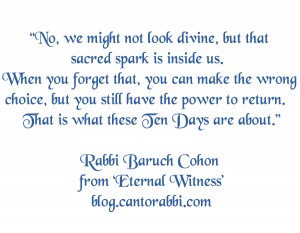ETERNAL WITNESS – Vayeylekh, Shabat Shuvah – Deut. 31, by Rabbi Baruch Cohon
Moses our Teacher is delivering his last speech, exhorting his people to keep the Torah he helped them receive. Gain courage and wisdom from it, he urges. No longer will he be with them to lead them, teach them, judge them. “Today I am 120 years old,” he says. “I cannot go out and come in.” Follow Joshua now because he will be the one to lead the way across the Jordan into the Promised Land. But above all, Moses calls on his people to write these words. “Take this Sefer Torah – this Book of the Law – and place it by the Ark of the Covenant of G-d. There it will be your witness.” An eternal witness. Those Torah scrolls, standing silent in every synagogue ark, are still bearing witness.
Witness to what? A realist to the end, Moses predicts wrong behavior by his people. After all, they have free will. They can choose the wrong road. And they will. “I know that after I die you will wreak destruction, you will leave the path I commanded you to follow, and evil will befall you.” Was he predicting disaster immediately after his death? Not at all. Rashi points out that the people did not engage in treasonous destruction all the days of Joshua. From this we learn that a faithful student is as valuable as his teacher. The evil would come later. As we know too well, it came many times.
But with the aid of the Torah, said Moses, we can return. A few centuries later, the prophet Hosea sings in our Haftorah: “Return, Israel, to the L-rd your G-d, for you have stumbled.” And so we have the opportunity to return, every year. Our Sabbath, this Sabbath, takes its name from Hosea’s prophecy: Shabat Shuvah – the Sabbath of Return. Coming as it does during the Ten Days of Repentance, it gives a very special and uniquely Jewish quality to this whole season. Because the Hebrew word t’shuvah is usually translated “repentance,” we could lose track of the fact that it comes from the same root as shuvah – “return.” The root is Shuv: Go back. Return to where you came from. Every morning the Jew prays: “My G0d, the soul You gave me is pure.” Christianity holds that man is born in sin. So he needs someone else to die to redeem him. That’s not the Jewish view. Each one of us is endowed with tzelem Elokim – the Divine image. No, we might not look divine, but that sacred spark is inside us. When you forget that, you can make the wrong choice, but you still have the power to return. That is what these Ten Days are about. From the New Year through Yom Kippur, we can take a close look at our lives, and we can return to where we should be.
Did you take advantage of your neighbor? You can make it up to him. Did your neighbor insult you? You can forgive him. Restore your relationship to a positive point, the point where it once was.
Did you implement your Judaism in your community? And through your own observance? Or were you lax? You can return.
What about the family? Did you honor your parents or did you neglect them? Did you treat your mate as one “sanctified to you,” as a “helper beside you” or as someone to take for granted? Did you teach your children by example? Or did you overdo your authority and make them rebel? Or perhaps did you just let them run wild? Many choices, many roads to stray on. These ten days give us the chance to return.
All the penitential prayers, all the ceremonies of forgiving each other, all the buildup to the holy fast day – it’s all a spiritual journey of return. We were there once. We can go back. Back home. Back to the Torah. It is to the success of our journey that Hosea looks as he concludes his vision: “You will give truth to Jacob, kindness to Abraham, as You swore to our fathers in days of old.”
So may it for us on this Sabbath of Return.



